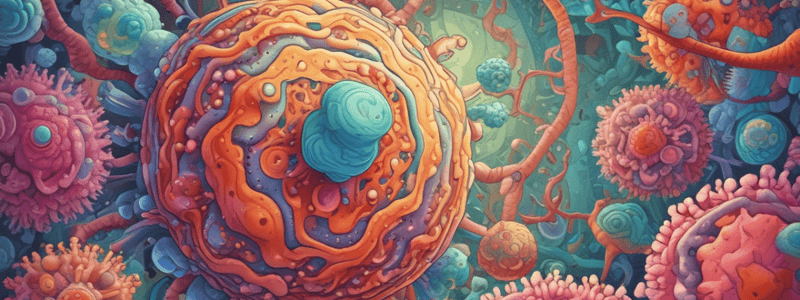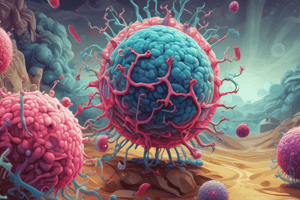Podcast
Questions and Answers
What is the characteristic of the Poliovirus genome?
What is the characteristic of the Poliovirus genome?
- Positive sense RNA (correct)
- Double-stranded DNA
- Single-stranded DNA
- Negative sense RNA
What is the primary site of Poliovirus replication?
What is the primary site of Poliovirus replication?
- Peyer's patches in the submucosa of the ileum (correct)
- Lymphoid tissues in the spleen
- Epithelial cells of the intestinal tract
- Anterior horn of lower motor neuron cell bodies
What is the mode of transmission of Poliovirus?
What is the mode of transmission of Poliovirus?
- Fecal-oral transmission (correct)
- Vector-borne transmission
- Direct contact transmission
- Airborne transmission
What is the characteristic of the Salk vaccine?
What is the characteristic of the Salk vaccine?
What is the effect of Poliovirus infection on the lower motor neuron cell bodies?
What is the effect of Poliovirus infection on the lower motor neuron cell bodies?
What is the characteristic of Poliovirus infection in the muscles?
What is the characteristic of Poliovirus infection in the muscles?
What is the complication of Poliovirus infection?
What is the complication of Poliovirus infection?
Where does Poliovirus replicate in the human body?
Where does Poliovirus replicate in the human body?
What type of RNA virus is Poliovirus?
What type of RNA virus is Poliovirus?
What is the mode of transmission of Poliovirus?
What is the mode of transmission of Poliovirus?
What type of vaccine is Sabin vaccine?
What type of vaccine is Sabin vaccine?
What is the characteristic of Poliovirus infection?
What is the characteristic of Poliovirus infection?
What is a common complication of Poliovirus infection?
What is a common complication of Poliovirus infection?
What is the effect of Poliovirus infection on the diaphragm?
What is the effect of Poliovirus infection on the diaphragm?
Flashcards are hidden until you start studying
Study Notes
Poliovirus Characteristics
- Poliovirus is a positive sense RNA virus.
- It is a naked virus, meaning it lacks an envelope.
Transmission and Replication
- Poliovirus is transmitted via the fecal-oral route, making it acid labile.
- The virus replicates in Peyer's patches, which are found in the submucosa of the ileum.
- Replication occurs in 2-3 weeks.
Effects on the Nervous System
- Poliovirus infection can lead to paralysis, particularly in the lower motor neurons.
- The virus can infect the anterior horn of lower motor neuron cell bodies, causing paralysis.
- The resulting paralysis is often asymmetric, affecting the lower legs, and can also lead to myalgia and respiratory deficiency due to diaphragm paralysis.
Vaccines
- There are two types of poliovirus vaccines: killed and live attenuated.
- Killed vaccines, like Salk, bypass the GI tract and only elicit IgG antibodies, not IgA.
- Live attenuated vaccines, like Sabin, go through the stomach mucosa and stimulate IgA production.
General Facts
- All enteroviruses, except rhinovirus, are transmitted via the fecal-oral route.
- Poliovirus replicates in lymphoid tissues.
Poliovirus Characteristics
- Poliovirus is a positive sense RNA virus.
- It is a naked virus, meaning it lacks an envelope.
Transmission and Replication
- Poliovirus is transmitted via the fecal-oral route, making it acid labile.
- The virus replicates in Peyer's patches, which are found in the submucosa of the ileum.
- Replication occurs in 2-3 weeks.
Effects on the Nervous System
- Poliovirus infection can lead to paralysis, particularly in the lower motor neurons.
- The virus can infect the anterior horn of lower motor neuron cell bodies, causing paralysis.
- The resulting paralysis is often asymmetric, affecting the lower legs, and can also lead to myalgia and respiratory deficiency due to diaphragm paralysis.
Vaccines
- There are two types of poliovirus vaccines: killed and live attenuated.
- Killed vaccines, like Salk, bypass the GI tract and only elicit IgG antibodies, not IgA.
- Live attenuated vaccines, like Sabin, go through the stomach mucosa and stimulate IgA production.
General Facts
- All enteroviruses, except rhinovirus, are transmitted via the fecal-oral route.
- Poliovirus replicates in lymphoid tissues.
Studying That Suits You
Use AI to generate personalized quizzes and flashcards to suit your learning preferences.




